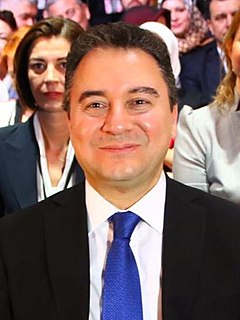Цитата Али Бабаджана
Когда Турция покупает иранскую нефть, мы платим за нее в турецких лирах... Однако Иран не может вывозить эти деньги в виде долларов в свою страну из-за международных ограничений, санкций США. Поэтому, когда Иран не может вернуть эти деньги в качестве валюты, они изымают турецкие лиры и покупают золото на нашем рынке.
Связанные цитаты
Когда Турция покупает иранскую нефть, мы платим за нее в турецких лирах... Однако Иран не может вывезти эти деньги в виде долларов в свою страну из-за международных ограничений, санкций США. Поэтому, когда Иран не может вернуть эти деньги в качестве валюты, они изымают турецкие лиры и покупают золото на нашем рынке.
С 1920-х по 1940-е годы уровень жизни в Британии поддерживался за счет нефти из Ирана. Британские автомобили, грузовики и автобусы работали на дешевой иранской нефти. Заводы по всей Британии питались нефтью из Ирана. Королевский флот, который демонстрировал британскую власть во всем мире, питал свои корабли иранской нефтью.
Когда дело доходит до предотвращения получения Ираном ядерного оружия, я не исключаю никаких вариантов. ... Это включает в себя все элементы американской мощи: политические усилия, направленные на изоляцию Ирана, дипломатические усилия по поддержанию нашей коалиции и обеспечению наблюдения за иранской программой, экономические усилия, вводящие сокрушительные санкции, и, да, военные усилия по быть готовым к любым непредвиденным обстоятельствам.
Отношения Турции с ближайшими соседями улучшаются. Им уже давно было совсем плохо - с Сирией было мерзко, а с Ираном совсем плохо. В обоих случаях Турция видит потенциал для торговли, особенно с Ираном, откуда она получает много природного газа. В хорошие времена Иран и Турция находят взаимовыгодные объекты обмена, но с Сирией дела обстоят очень плохо; У Сирии нет больших денег и никогда не будет.
Генерал [Джеймс] Мэттис сказал, что сделка заключена. Мы не можем в одностороннем порядке выйти из него без поддержки со стороны наших союзников, потому что санкции не будут так сильно бить. И поэтому он найдет другие способы дать отпор Ирану в различных конфликтах, которые Иран разжигает вокруг [иранского] региона.
Я достаточно интернационален. Мое происхождение, родился в Турции. Моя семья — еврейская семья из Ирана, поэтому я уехал из Турции в Иран, затем в Израиль, а затем вырос в Италии и оказался в США, чтобы учиться в аспирантуре. Так что я склонен смотреть на вещи с международной точки зрения, и я думаю, что это дает вам немного более широкое представление о том, что происходит.
В соответствии с нынешней политикой США из-за этой борьбы за власть американские нефтяные компании не могут вести дела с Ираном. Поэтому я думаю, что конечной целью администрации США в Иране является смена режима, приведение к власти прозападного правительства, которое устранит стратегический вызов интересам США и, в то же время, позволит отменить санкции и разрешить американскую нефть компаний для ведения бизнеса с Ираном.
Мы поддерживаем любую сделку, которая лишает Иран ядерного оружия, предусматривает непрерывный и надежный механизм инспекций и предусматривает возврат в случае нарушения Ираном соглашения. Мы обеспокоены тем, что Иран будет использовать доходы, полученные в результате отмены ядерных санкций, для финансирования своей гнусной деятельности в регионе.
После десятилетия общественной деятельности, направленной на то, чтобы помешать Ирану когда-либо получить ядерное оружие, я не могу поддержать сделку, предусматривающую снятие санкций с Ирана на миллиарды долларов в обмен на то, что он позволит ему поддерживать передовую ядерную программу и инфраструктуру порогового ядерного государства.
Понятно, что причины для недовольства в Иране есть – причины экономические и политические. Мы неоднократно заявляли иранскому руководству, что восстановление экономики страны в конечном счете может быть успешным только за счет расширения международного экономического сотрудничества. И предпосылкой для этого является не только отказ Ирана от разработки ядерного оружия, но и гораздо более мирная роль Ирана в регионе. Мы предложили, наконец, провести настоящие переговоры и переговоры по этому вопросу.































